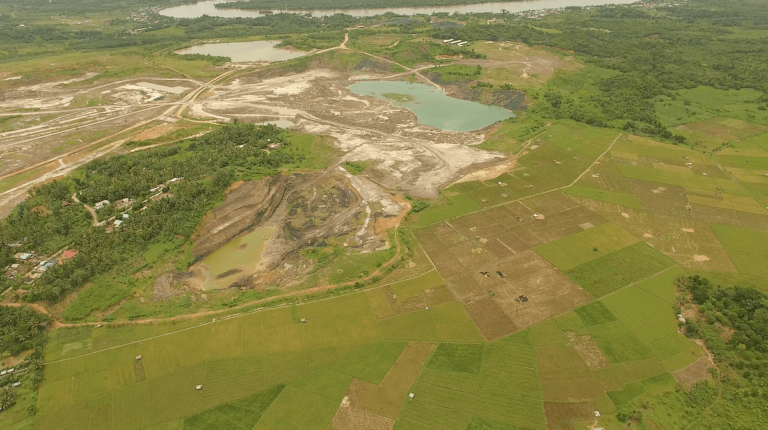Report Reveals Coal Mining a Major Obstacle to Indonesian Food Security
By: Waterkeeper Alliance

Indonesian mining advocacy network, JATAM, and international clean water nonprofit, Waterkeeper Alliance, today released a damning report, “Hungry Coal – Coal Mining and Food Security in Indonesia,” that shows coal mining is the main threat to Indonesian food security and a major land-use policy conflict that demands government intervention.
The report reveals that almost 10 percent of Indonesia’s land is allocated to coal mining, 80 percent of which is under exploration and poses the greatest risk to Indonesia’s food security than any other land use. Indonesia’s national government has reined in the expansion of oil palm planting and has promised a similar check of coal’s expansion, but as yet these promised reforms remain outstanding.
The report further reveals that coal companies are avoiding compliance with Indonesia’s land rehabilitation and water protection regulations. The current condition of mined land causes acid mine drainage that kills fish and destroys rice crops. Indonesia’s water quality regulations do not adequately protect fish farming and agriculture from the heavy metals released by coal mines.
“Operating coal mines occupy almost 4 million hectares in Indonesia and are having a devastating impact. Coal mining leaves the land scarred and barren, water catchments choked and polluted, and groundwater depressed. The current poor compliance with coal mine rehabilitation means that coal mining can confidently be assumed to destroy any potential cultivation on the land that it affects,” said JATAM National Coordinator, Merah Johansyah.
“Farmers interviewed for the report told us that mine pit water is causing rice yields to drop by 50 percent and fish production by 80 percent. All but two of the 17 water samples we took from coal mine sites in East Kalimantan and surrounding waterways had concentrations of aluminum, iron, manganese and/or pH levels that would be expected to lower rice and fish farm yields,” said Paul Winn, International Energy Campaigner with Waterkeeper Alliance.
The report identifies coal mining concessions covering 19 percent of existing rice cultivation and 23 percent of land capable of rice cultivation outside of Java and estimates that coal mining has already reduced Indonesia’s annual rice production by 1.7 million tonnes and that 6 million tonnes of annual rice production is at risk. If coal companies are allowed to mine exploration concessions that cover existing cultivated land, the report estimates that almost 18.5 million tonnes of potential annual rice production could be lost if mining proceeds on all the coal concessions that cover land capable of growing rice.
“Indonesia cannot afford to lose valuable food producing land to coal. Nor can it continue to allow its water resources, essential for crops, to be polluted and choked with sediment. If the country is to continue to feed itself, the National Government must radically alter its land use priorities,” said Donna Lisenby, Clean and Safe Energy campaign manager with Waterkeeper Alliance.
Key Findings:
- Coal mining and coal exploration is the largest net industrial land use allocation in Indonesia, covering almost 17.5 million hectares.
- Contrary to Indonesian regulations, most coal companies leave mined land and water resources damaged and useless for food production which continues long after mining.
- Due to the depletion of groundwater and surface water catchment caused by coal mining, villagers surrounding coal mines are forced to use mine pit water for washing, bathing, irrigation of crops and fish farming. Farmers using mine pit water report rice yields down 50 percent and fish production down 80 percent.
- All but two of the 17 water samples taken from coal mines and surrounding waterways had concentrations of aluminum, iron, manganese and/or pH levels likely to have an impact on crop production and fish farming. Indonesia’s water quality guidelines do not set maximum allowable concentration for these heavy metals in water used for aquaculture or agriculture.
- Coal concessions cover 19 percent of Indonesia’s existing mapped rice land and 23 percent of land identified as capable of growing rice. Much of the land identified a capable of rice cultivation is occupied by forestry and oil palm plantations, yet unlike coal mining, these land uses do not exclude its use for future food production.
- We estimate that about 1.7 million tonnes of rice per year has been lost due to coal mining and 6 million tonnes per year of rice production is at risk from existing cultivated land. If coal concessions within the area of land identified as capable of rice cultivation is mined an additional 11 million tonnes of rice per year will be lost.
- If Indonesia’s rice systems are improved with irrigation, better seed varieties and fertilizer, over 50 million tonnes of Indonesia’s potential rice production is at risk to coal mining.
For the Bahasa version of the report, click here.